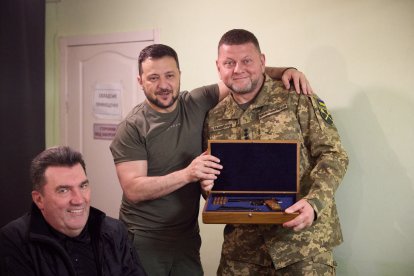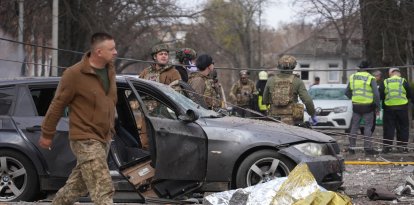"The whole thing was born out of a night of heavy boozing": Ukraine's plot to blow up Nord Stream according to 'WSJ'
The Wall Street Journal sources who unveiled the plot to sabotage the gas infrastructure assure that everything was simpler than speculations pointed out.

Zelenski and Gen. Valery Zaluzhny
Ukraine's entire plan to sabotage the Nord Stream gas line was hatched in one drunken night is what several sources from the Wall Street Journal are claiming, who told the media outlet in detail how the attack on the gas infrastructure connecting Russia to Europe was engineered.
The information now unveiled, which comes from Ukrainian military and government sources, comes after German and Polish authorities announced that an individual of Ukrainian nationality is wanted for his connection to the Baltic Sea gas pipeline sabotage.
Victory party on the front lines
According to sources cited by the Wall Street Journal, several Ukrainian military commanders and businessmen organized a soiree in May 2022 to celebrate that Kiev forces had succeeded in stopping the advancing Russian invasion.
It was during this party that it was first suggested to destroy the 760-mile-long pipeline with the capacity to transport more than 55 billion cubic meters of gas to Germany annually. "I always laugh when I read media speculation about some huge operation involving secret services, submarines, drones and satellites," an official involved in the plot said, according to the Wall Street Journal. "The whole thing was born out of a night of heavy boozing and the iron determination of a handful of people who had the guts to risk their lives for their country."
None of the claims made by the Wall Street Journal military sources could be verified. During the months following the pipeline sabotage in September 2022, suspicions hung over both Russia and the United States. Especially after the United States had historically opposed the project and its extension, Nord Stream 2.
Zelenski approved the plan first and asked to cancel it later
However, after the CIA became aware of the Ukrainians' intentions, it conveyed to Zelenski its disapproval with the plan. Following this, Zelenski called for a halt.
Everything went on as planned, despite Zelenski's order. According to the WSJ, the then commander-in-chief of the Armed Forces, Valerii Zaluzhnyi, the main person responsible for the plan, decided to go ahead.
Valerii Zaluzhnyi has been Ukraine's plenipotentiary ambassador to the United Kingdom since March 2024 and has denied the incident. He said he was unaware of any such operation and that any suggestion to the contrary is a "mere provocation." He added that the Ukrainian armed forces were not authorized to carry out missions abroad and therefore would not have taken part in them.
Five divers and one woman
According to the account, Ukraine assembled a team composed of both military and civilians with solid experience in the marine field. Ukraine has military personnel with very good training for underwater operations and chose a total of six people to carry out the sabotage.
Among them was a woman, who in addition to having deep-sea diving training, would serve to give a more casual appearance to the group. The Ukrainian commando had a budget of about $300,000. Through a travel agency set up by Ukrainian intelligence in Poland, they acquired a leisure boat, the Andromeda.
They left the German port of Rostock and set course for the coordinates of the Baltic Sea below which the Nord Stream passed. Despite bad weather, they carried out the operation and blew up a segment of the pipeline with explosives.
According to the WSJ, Zelenski reprimanded Zaluzhnyi for what happened. The general reportedly assured Zelenski that the sabotage team, once dispatched, was cut off from communication and could not be recalled because any contact with them could have compromised the operation.
RECOMMENDATION






















